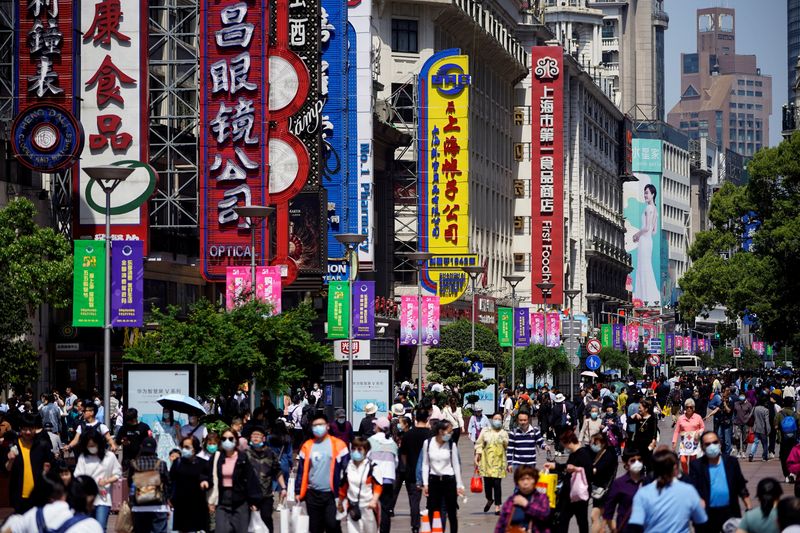
China Feb factory inflation eases, spotlight on global commodities By Reuters

© Reuters. FILE PHOTO: People walk along Nanjing Pedestrian Road, a main shopping area, in Shanghai, China May 5, 2021. REUTERS/Aly Song
By Liangping Gao and Ryan Woo
BEIJING (Reuters) -China’s factory inflation in February eased to the slowest annual pace in eight months, but analysts expect a pick-up in the coming months from surging prices of global commodities including oil, challenging policy-making to support the economy.
The producer price index (PPI) increased 8.8% on year, the National Bureau of Statistics (NBS) said in a statement on Wednesday, easing from 9.1% growth in January but just higher than an 8.7% rise in a Reuters poll.
Many Chinese factories closed in the first half of February due to Lunar New Year festivities, putting a temporary leash on demand for raw materials. But the war in Ukraine that erupted late last month has since raised concerns of global supply disruptions, pushing commodity prices to decade-highs.
Month-on-month, the PPI swung to a gain from a decline in January, with international prices rising sharply and driving up prices in domestic oil-related industries, according to a separate NBS statement. Local prices of non-ferrous metals also rose.
“We expect year-over-year PPI inflation to stay elevated in the near-term as oil and metal prices increased sequentially due to geopolitical tensions,” Goldman Sachs (NYSE:) analysts wrote in a note.
On Monday, an official at the state economic planner also said China’s efforts to stabilise commodity prices face new challenges partly due to geopolitical conflicts.
China sources more than 70% of its oil and 40% of its gas from overseas even as the government races to increase domestic output.
Persistently high oil prices prompted by Russia’s attack on Ukraine could cut a full percentage point off the growth of large oil-importing developing economies including China, according to the World Bank on Tuesday.
China is targeting slower economic growth of around 5.5% in 2022 compared with last year, with the government citing headwinds at home and abroad.
POLICY
China’s central bank in December cut the reserve requirement ratio (RRR) for commercial lenders, or the amount of cash that banks must hold in reserve, by 50 basis points, releasing 1.2 trillion yuan ($190 billion) in long-term liquidity.
Some analysts said the scope for monetary easing may now be limited due to the threat of higher commodity prices.
“Sanctions on Russia could axe China-Russian trade and may lead to higher imported prices,” said Bruce Pang, Head of Macro and Strategy Research at China Renaissance Securities.
The central bank said on Tuesday it will pay more than 1 trillion yuan in profit to the central government this year, in a bid to help support fiscal spending.
The profits come from its foreign exchange reserve operations in recent years, said the People’s Bank of China (PBOC).
“The PBOC’s profit transfer is a better way to ease money supply in my opinion,” said Tian Yuan, former vice director of the Beijing Economic Operation Association.
“The focus of the PBOC this year would be adjustments on the structure of assets and liabilities to keep a relative loose monetary policy.”
According to ANZ Research, the PBOC profit transfer is equivalent to a liquidity boost from an RRR cut of more than 50 basis points.
China’s consumer price index (CPI) inched up 0.9% in February, the data showed, unchanged from the growth in January and market expectations.
The Chinese government left its 2022 CPI target, unveiled on Saturday, at around 3%, unchanged from 2021. Last year, the CPI rose just 0.9%, reined in by cautious consumer spending.
($1 = 6.3170 renminbi)
Stay connected with us on social media platform for instant update click here to join our Twitter, & Facebook
We are now on Telegram. Click here to join our channel (@TechiUpdate) and stay updated with the latest Technology headlines.
For all the latest Education News Click Here
For the latest news and updates, follow us on Google News.

